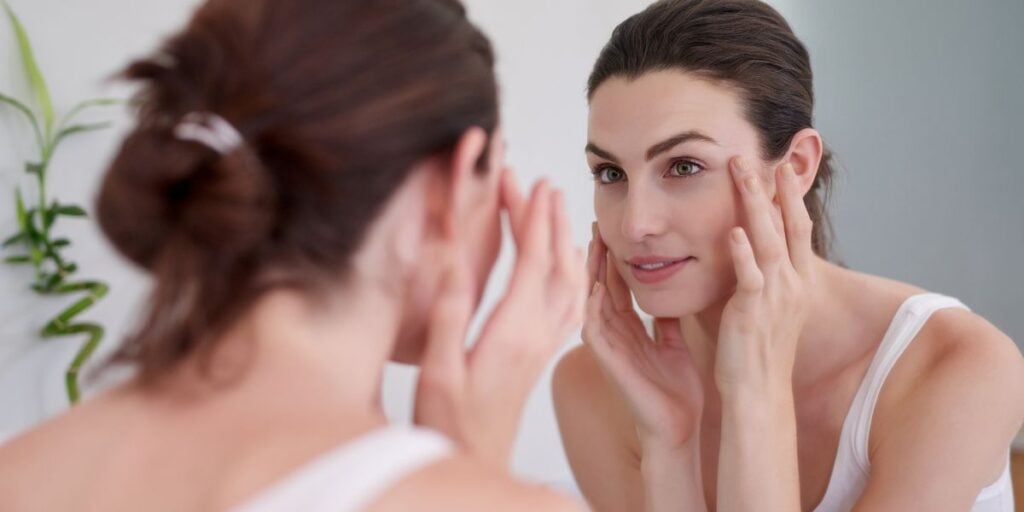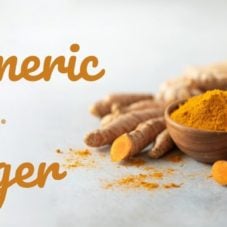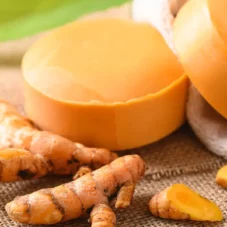Antioxidants, Wellbeing
6 Turmeric Benefits For Skin: Can It Make You Look Younger?
Turmeric’s fame goes beyond curry and golden milk lattes. Celebrities and influencers alike have been raving about turmeric benefits for skin, such as its anti-aging and acne-fighting properties. In this blog post, we’ll discover if turmeric (and its bioactive component, Curcumin) can help with acne, psoriasis, wrinkles, dark spots, and more!
Table of Contents
Can turmeric help slow down skin aging?
Our skin loses its plumpness and smoothness as we grow older. Conversely, the number of wrinkles, dark circles, and age spots only seems to increase daily. While collagen is probably the hottest anti-aging skin supplement right now, don’t count out turmeric just yet!
You see, turmeric’s antioxidant and anti-inflammatory properties may help slow down the effects of inflammaging on the skin.
Inflammaging refers to low-grade inflammation associated with getting older. It affects collagen production, impairs the skin barrier, and accelerates skin cell damage, making the skin look older.1
Fortunately, one study reported that taking curcumin orally (as opposed to topically) may help fight the effects of inflammaging. Curcumin can slow down skin aging by reducing low-grade inflammation. It can also reduce the risk of age-related diseases.2
Turmeric benefits include improving skin firmness and elasticity.3 It’s also an effective moisturizer since it can help retain the skin’s water content.4 So, to answer the question, turmeric may indeed be an effective anti-aging herb!
Related article: Meriva Curcumin: An Ultimate Guide To Turmeric’s Most Potent Compound
Can turmeric help with dark spots on the skin?
Dark spots or age spots are examples of hyperpigmentation. Exposure to the sun’s UV rays speeds up melanin production, the pigment that determines our natural skin color.
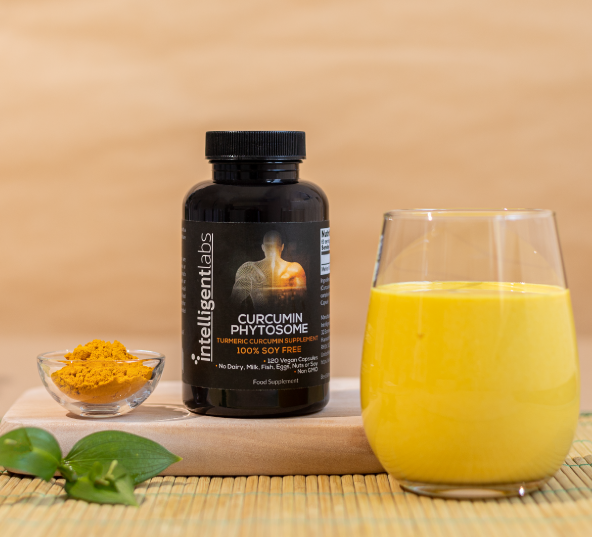
Excessive melanin causes age spots and melasma (patches of skin darker than your natural skin tone).
Turmeric curcumin may help brighten up the dark spots by slowing tyrosinase production; this is the enzyme responsible for melanin production.5 6
Curcumin may therefore give you a more even and brighter complexion!
Can turmeric help with acne?
Acne often starts rearing its ugly bumps in puberty, when hormones go into overdrive. Excess hormones cause an increase in oil (sebum) production. Sebum and dead skin cells plug up the pores, and the bacteria on the skin feeds on this mixture. More bacteria lead to inflammation, making the area red and swollen.
Antibiotics can help treat bacterial acne. However, overuse can produce antibiotic-resistant strains. Fortunately, this isn’t a problem for turmeric.
There is evidence to prove that turmeric’s antibacterial properties work well against bacteria-causing acne. In one study, researchers successfully demonstrated that a curcumin and lauric acid formulation could inhibit the growth of bacteria.7 This suggests that turmeric/curcumin may indeed help with acne!
Can turmeric help with fungal skin infections?
Most skin infections are due to an overgrowth of Candida, a type of yeast that lives both on the skin and inside the body. Candida skin infections are known as cutaneous candidiasis. Affected areas usually include the armpits and groin.
Studies on the antifungal activity of curcumin have been promising so far. In one study, curcumin was effective against several fungi strains, including various Candida species. It was even more effective than the antifungal drug fluconazole.8
A recent study supported curcumin’s potent antifungal action against Candida. The researchers reported that curcumin extract concentration is inversely proportional to Candida colonies. That is, the higher the curcumin dosage, the fewer the Candida.9
But here’s where it gets exciting – combining curcumin with vitamin C increased both compounds’ antifungal and antioxidant activities by 5x to 10x!10 This study suggests that taking curcumin and vitamin C together may be a good idea, especially when treating fungal skin infections.
Can turmeric help with psoriasis?
Psoriasis is a chronic, inflammatory skin disease with no known cure. It causes scaly and itchy patches on the skin called plaques. They can appear anywhere on the body but are most common on the scalp, back, arms, and legs.
There are drugs available to help keep symptoms under control; however, they also come with side effects. The good news is that studies prove curcumin may help manage psoriasis.11
A systematic review published in 2022 looked at 26 curcumin studies. The researchers found that curcumin therapy (both alone and in combination with other drugs) helped improve symptoms significantly in both human patients and animal models.12
The same study also confirmed curcumin’s anti-inflammatory action at the cellular level. They were also able to see that it did slow psoriasis cell growth. These findings are significant because the rapid growth of skin cells is a psoriasis hallmark. By inhibiting growth and inflammation, turmeric may indeed help with psoriasis!
Can turmeric help with eczema?
Eczema is a skin condition that may be even itchier than psoriasis, although it’s generally less inflamed. There are also no scales or patches of thick raised skin that are present in psoriasis.
Unfortunately, no studies have been done yet on turmeric’s effect on eczema. A couple of studies used polyherbal formulations, and the subjects did report reductions in symptoms.13 14 However, due to the nature of the herbs used, we cannot say that turmeric alone can help with eczema.
Nevertheless, turmeric is considered a safe and natural herbal remedy, and there is science to support its numerous benefits on skin health. So, it may still be a useful addition to this list of home remedies to relieve eczema.
Related article: 10 Meriva Curcumin Phytosome Benefits You Need to Know About
How to take turmeric for skin health?
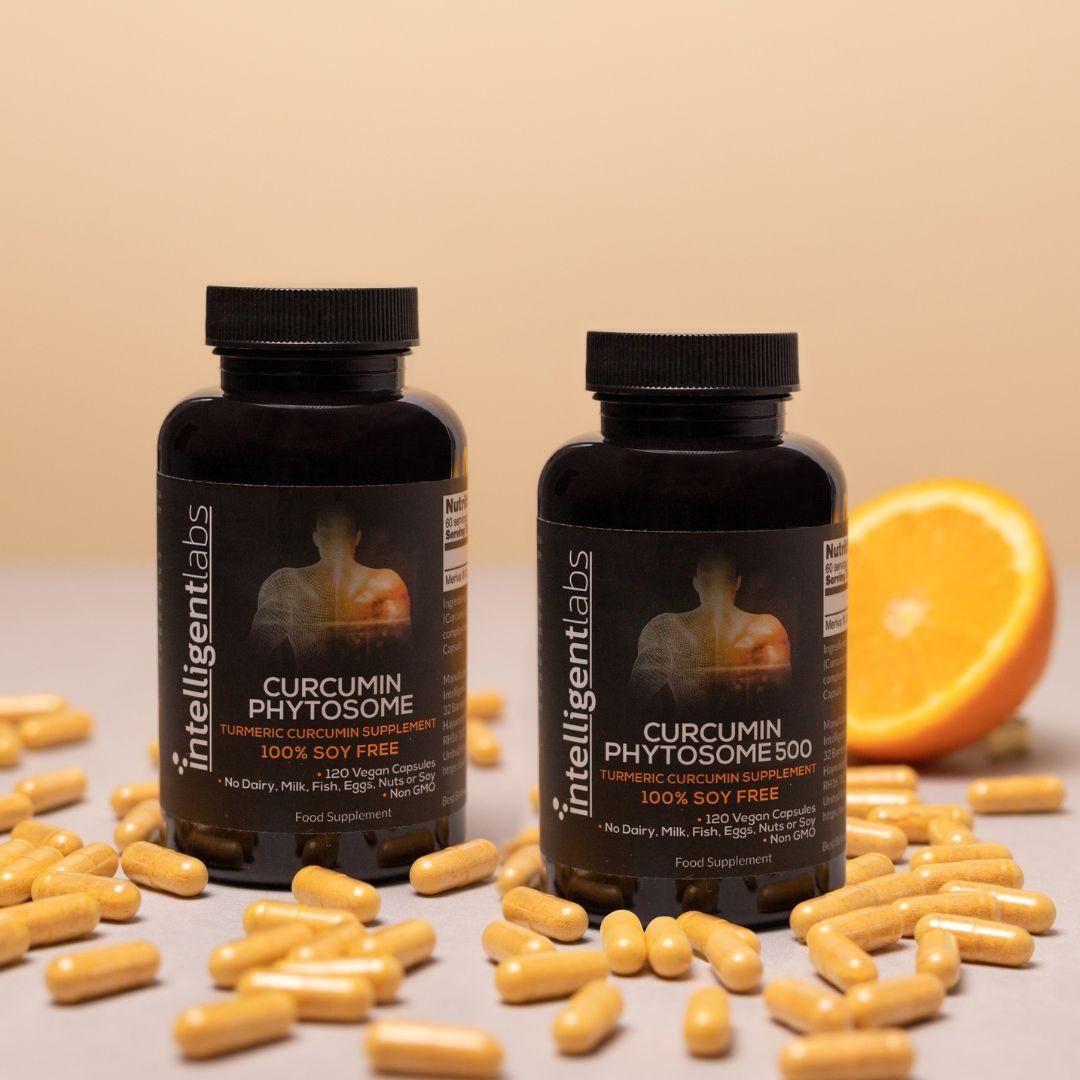
There are several ways to take turmeric so you can take advantage of its skin health benefits.
Turmeric is widely available in fresh, dried, or powdered form. You can add it to curry, soup, and many other dishes. Or add milk and water to turmeric powder to make a delicious golden milk latte.
If you want to benefit from everything turmeric offers, then it’s best to take it in supplement form. Why? Because the bioactive component – curcumin – is absorbed very poorly by the body. In fact, 100g of turmeric powder will only contain about 3.14g of curcumin.15
However, not all turmeric supplements are created equal. Some contain plain turmeric powder; others contain black pepper to help increase absorption.
All of these products pale compared to our Intelligent Labs Curcumin Phytosome supplements. We use Meriva’s patented delivery system to increase absorption rates by up to 2900%.16 Our curcumin supplements come in two doses – 250mg Curcumin Phytosome and 500mg Curcumin Phytosome. Both products are standardized to contain 20% curcuminoids.
Conclusion
As you’ve learned in this article, there is science to support turmeric’s benefits for the skin. It may help slow skin aging and help you do away with wrinkles and dark spots. It may also help with acne, fungal skin infections, and psoriasis. For best results, use our Intelligent Labs Curcumin Phytosome supplement. They’re far more bioavailable than regular turmeric!
💬 Something on your mind? Share your thoughts in the comments. We love hearing from curious minds.
📩 And while you’re here, join our newsletter for more smart stuff (and secret perks)!
References
- Inflammaging and the Skin, Suzanne M. Pilkington, Silvia Bulfone-Paus et al. Journal of Investigative Dermatology, Volume 141, Issue 4, Supplement, April 2021, Pages 1087-1095 ↩︎
- The Role of Curcumin in the Modulation of Ageing, Anna Bielak-Zmijewska, Wioleta Grabowska et al. Int J Mol Sci. 2019 Mar; 20(5): 1239. ↩︎
- Sommerfeld B. Randomised, placebo-controlled, double-blind, split-face study on the clinical efficacy of Tricutan on skin firmness. Phytomedicine. 2007;14(11):711-715. ↩︎
- Asada K, Ohara T, Muroyama K, Yamamoto Y, Murosaki S. Effects of hot water extract of Curcuma longa on human epidermal keratinocytes in vitro and skin conditions in healthy participants: A randomized, double-blind, placebo-controlled trial. J Cosmet Dermatol. 2019;18(6):1866-1874. ↩︎
- Rathee, P., Kumar, S., Kumar, D. et al. Skin hyperpigmentation and its treatment with herbs: an alternative method. Futur J Pharm Sci 7, 132 (2021). ↩︎
- Validation of medicinal herbs for anti-tyrosinase potential, Pulok K. Mukherjee, Rajarshi Biswas et al. Journal of Herbal Medicine, Volume 14, December 2018, Pages 1-16 ↩︎
- In Vitro Anti-Propionibacterium Activity by Curcumin Containing Vesicle System, Chi-Hsien Liu, Hsin-Ying Huang, 2013 Volume 61 Issue 4 Pages 419-425 ↩︎
- C. V. B. Martins and others, Curcumin as a promising antifungal of clinical interest, Journal of Antimicrobial Chemotherapy, Volume 63, Issue 2, February 2009, Pages 337–339 ↩︎
- Mental Nerves in the Lower Lip: Anatomical Basis for the Recovery of Sensation following Inferior Alveolar Nerve Damage, Plastic and Reconstructive Surgery, January 24, 2023 ↩︎
- Curcumin antifungal and antioxidant activities are increased in the presence of ascorbic acid, Omar Arafat Kdudsi Khalil, Olga Maria Mascarenhas de Faria Oliveira et al. Food Chemistry, Volume 133, Issue 3, 1 August 2012, Pages 1001-1005 ↩︎
- Use of Curcumin in Psoriasis, Veronica Di Nardo, Serena Gianfaldoni et al. Open Access Maced J Med Sci. 2018 Jan 25; 6(1): 218–220. ↩︎
- Efficacy and safety of curcumin in psoriasis: preclinical and clinical evidence and possible mechanisms, Shuo Zhang, Jiao Wang et al. SYSTEMATIC REVIEW article Front. Pharmacol., 29 August 2022 ↩︎
- Rawal RC, Shah BJ, Jayaraaman AM, Jaiswal V. Clinical evaluation of an Indian polyherbal topical formulation in the management of eczema. J Altern Complement Med. 2009;15(6):669-672. ↩︎
- Khiljee S, Rehman N, Khiljee T, Loebenberg R, Ahmad RS. Formulation and clinical evaluation of topical dosage forms of Indian Penny Wort, walnut and turmeric in eczema. Pak J Pharm Sci. 2015;28(6):2001-2007. ↩︎
- Curcumin Content of Turmeric and Curry Powders, Reema F. Tayyem,Dennis D. Heath,Wael K. Al-Delaimy &Cheryl L. Rock, Pages 126-131 | Published online: 18 Nov 2009 ↩︎
- Cuomo J, Appendino G, Dern AS, et al. Comparative absorption of a standardized curcuminoid mixture and its lecithin formulation. J Nat Prod. 2011;74(4):664-669. ↩︎

